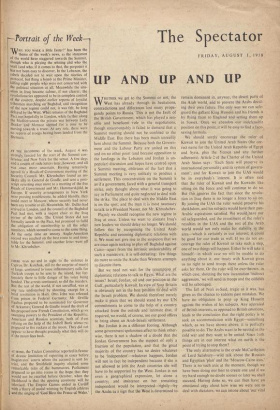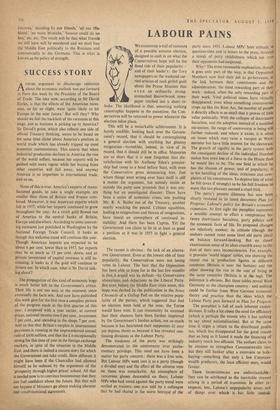UP AND UP AND UP
WNETHER we get to the Summit or not, the West has already through its hesitations, contradictions and differences lost many propa- ganda points to Russia. This is not the fault of the British Government, which has played a sen- sible and beneficent role in the negotiations, though unaccountably it failed to demand that a Summit meeting should not be confined to the Middle East. But there has been much unreality here about the Summit. Because both the Govern- ment and the Labour Party are united on this and on no other point (and because opposition to the landings in the Lebanon and Jordan is un- popular) discussion and hopes have centred upon a Summit meeting, oblivious of the fact that a Summit meeting is very unlikely to, produce a settlement. This concentration on the Summit is as if 'a government, faced with a general transport strike, only thought about what it was going to say in Parliament and quite neglected to deal with the strike. The place to deal with the Middle East is on the spot; and the man it is most necessary to talk to is President Nasser, not Mr. Khrushchev.
Plainly we should recognise the new regime in Iraq at once. Unless we want to alienate Iraq's new leaders we should delay no longer. We should follow this by , recognising the United Arab Republic and resuming diplomatic relations with it. We must not give rise to the suspicion that we are once again seeking to play off Baghdad against Cairo—apart from the intrinsic undesirability of such a manoeuvre, it is self-defeating: few things do more to unite the Arabs than Western attempts to disunite them.
But we need not wait for the cesuolpLion of diplomatic relations to talk to Egypt. What are the issues? Israel, Jordan, oil and. our position in the Gulf, particularly Kuwait. In view of Suez Britain is obviously not in the best position t& deal witli the Israeli problem. We should therefore merely make it plain that we should stand by our UN commitments to come to the help of a country attacked from the outside and intimate that, if required, we would, of course, use our good offices to bring about an Arab-Israeli settlement.
But Jordan is on a different footing. Although some government spokesmen affect to think other- wise, there is not a shadow of a doubt that the Jordan Government has the support of /poly a fraction of the population, and that the "great majority of the country has no desire whatever to be 'independent'—whatever happens, Jordan will not in fact be independent because if she is not allowed to join the Arab countries she will have to be supported by the West. Jordan is not even a geographical expression, let alone a country; and insistence on her remaining independent would be interpreted—rightly—by the Arabs as a sign that the West is determined• to remain dominant in, anyway, the desert parts of the Arab world, and to prevent the Arabs decid- ing their own future. The only way we can safe- guard. the gallant King Hussein and his friends is by flying them to England and setting them up in Sussex. Once we abandon our indefensible position on this point, it will be easy to find a face-, saving formula.
We should surely encourage the ruler -of Kuwait to join the United Arab States (the cor- rect name for the United Arab Republic of Egypt and Syria, plus the Yemen and any further adherents). Article 2-of the Charter of the United Arab States says : 'Each State will preserve its international personality and its system of govern- ment'; and for Kuwait to join the UAS would be in everybody's ' interest. It is often said that the ruler of Kuwait and the Kuwaitis like sitting on the fence and will continue to do so. But this ignores the fact that since the revolu- tion in Iraq there is no longer a fence to sit on. By joining the UAS the ruler would preserVe his sheikhdom, and his subjects would have their pan- Arabic aspirations satisfied. We would:,have our oil safeguarded, and the investment of the ruler's royalties in the UAS and the rest of the Arab World would not only make for stability in the area—which is certainly in our interest; it could be good for our trade as well. If we do not en- courage the ruler of Kuwait to take such a step, one of two things will happen. Either he will take it himself—in which case we will be unable to do anything about it; our treaty with Kuwait gives us no right to send troops there unless the ruler asks for them. Or the ruler will be overthrown, in which case, shouting the 'new incantation 'indirect aggression,' we will send in troops and the oilfields will be sabotaged.
The NI of Nuri es-Said, tragic as it was, has given us the chance to redeem past mistakes. We have no obligation to prop up King Hussein against the wishes of his subjects. Any appraisal of British interests, as opposed to British emotions, leads to the conclusion that the right policy is to seek an accommodation with Egypt—something which, as we have shown above, it is perfectly possible to do. The Arabs want to be neutral in the cold war and they want to be united. Since oth things are in our interest what on earth is the point of trying to stop them?
The only alternative is the crude McCarthyism of Lord Salisbury—wild talk about the Russian and Egyptian 'plan' and the 'Moscow-Cairo axis.' There is no such axis at the moment, though we have been doing our best to create one and if we try hard enough no doubt sooner or later we shall succeed. Having done so, we can then have an emotional orgy about how wise we were not to deal with dictators; we can intone about 'our vital interests,' standing by our friends,' oil our lila blood,' no more Munichs,"honour could do no less,' etc. etc. The result will be that what friends we still have will be murdered and we shall lose the Middle East politically to the Russians and commercially to the Germans. This is what is known as the policy of strength.































 Previous page
Previous page